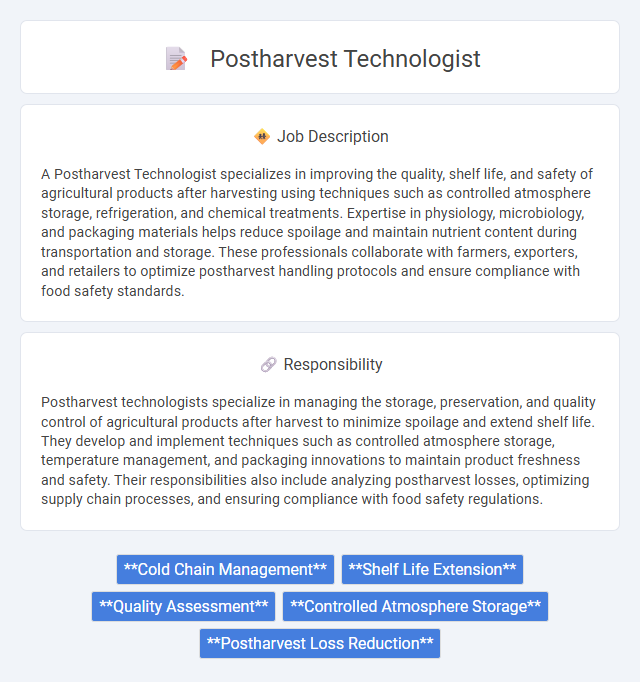
A Postharvest Technologist specializes in improving the quality, shelf life, and safety of agricultural products after harvesting using techniques such as controlled atmosphere storage, refrigeration, and chemical treatments. Expertise in physiology, microbiology, and packaging materials helps reduce spoilage and maintain nutrient content during transportation and storage. These professionals collaborate with farmers, exporters, and retailers to optimize postharvest handling protocols and ensure compliance with food safety standards.
Individuals with a strong interest in biology, agriculture, and food science are likely to find a postharvest technologist role suitable, as it involves analyzing and improving the storage and preservation of crops. Those who enjoy problem-solving, working in laboratories, and collaborating with farmers and supply chain experts may be particularly well-suited. The job may be less ideal for people who prefer routine tasks or avoid scientific research and fieldwork environments.
Qualification
A Postharvest Technologist typically requires a bachelor's degree in agricultural science, food technology, or a related field, with advanced knowledge of postharvest physiology, storage, and preservation techniques. Expertise in quality control, supply chain management, and modern postharvest technologies like controlled atmosphere storage or refrigeration is essential. Practical experience with laboratory analysis and data interpretation enhances the candidate's ability to optimize product shelf life and reduce postharvest losses.
Responsibility
Postharvest technologists specialize in managing the storage, preservation, and quality control of agricultural products after harvest to minimize spoilage and extend shelf life. They develop and implement techniques such as controlled atmosphere storage, temperature management, and packaging innovations to maintain product freshness and safety. Their responsibilities also include analyzing postharvest losses, optimizing supply chain processes, and ensuring compliance with food safety regulations.
Benefit
Postharvest technologists likely contribute to reducing food waste by improving storage and handling techniques, which can enhance product shelf life and quality. Their expertise probably supports increased profitability for producers and suppliers through better marketability of fresh produce. They may also play a crucial role in food safety, minimizing spoilage-related health risks.
Challenge
Postharvest technologists likely face the challenge of minimizing crop spoilage while optimizing storage conditions to extend shelf life. They probably need to address complex variables such as temperature, humidity, and packaging materials to reduce quality loss. This role may also involve navigating unpredictable factors like climate variability and supply chain disruptions that impact produce preservation.
Career Advancement
Postharvest technologists play a critical role in enhancing the shelf life and quality of agricultural produce through advanced preservation techniques and innovative storage solutions. Career advancement in this field often involves specializing in areas such as food safety, supply chain optimization, or biotechnology, leading to roles like senior technologist, research and development manager, or quality assurance director. Expertise in regulatory compliance and experience with cutting-edge postharvest technologies significantly increase opportunities for leadership positions within agribusinesses and food processing companies.
Key Terms
Cold Chain Management
Postharvest technologists specializing in cold chain management ensure the optimal storage and transportation conditions for perishable goods, minimizing spoilage and extending shelf life through precise temperature and humidity control. Their expertise in refrigeration systems, packing materials, and real-time monitoring technologies plays a crucial role in maintaining product quality from farm to consumer. Effective cold chain management directly impacts food safety standards, reduces economic losses, and enhances supply chain efficiency in agriculture and food industries.
Shelf Life Extension
Postharvest technologists specialize in extending the shelf life of fruits, vegetables, and other perishable products by applying innovative techniques such as controlled atmosphere storage, cold chain management, and the use of natural preservatives. Their expertise in minimizing spoilage and maintaining quality through biochemical and physiological interventions reduces postharvest losses significantly. Advanced knowledge in packaging technology and storage environment optimization plays a critical role in enhancing product longevity and marketability.
Quality Assessment
A Postharvest Technologist specializing in Quality Assessment evaluates the physical, chemical, and microbiological attributes of harvested crops to ensure optimal freshness and safety. They utilize advanced techniques such as spectrometry and texture analysis to monitor quality parameters and identify potential degradation or contamination. Their role is crucial in extending shelf life, minimizing postharvest losses, and maintaining compliance with food safety standards.
Controlled Atmosphere Storage
Postharvest technologists specializing in Controlled Atmosphere Storage optimize oxygen, carbon dioxide, and humidity levels to extend the shelf life and maintain quality of fruits and vegetables. They utilize advanced monitoring systems to prevent spoilage and physiological disorders during storage. Expertise in atmospheric composition adjustments enhances produce preservation and reduces postharvest losses in supply chains.
Postharvest Loss Reduction
Postharvest technologists specialize in reducing postharvest losses by implementing advanced preservation techniques such as controlled atmosphere storage, temperature management, and moisture control. They analyze crop physiology and storage conditions to minimize spoilage, microbial contamination, and quality degradation during handling, transportation, and storage. Expertise in postharvest loss reduction directly enhances food security and economic sustainability for agricultural supply chains.
 kuljobs.com
kuljobs.com